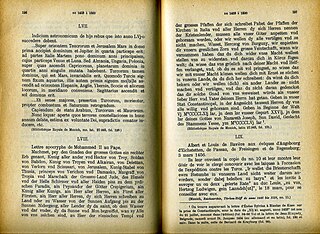
Apocrypha are biblical or related writings not forming part of the accepted canon of Scripture. While some might be of doubtful authorship or authenticity, in Christianity, the word apocryphal (ἀπόκρυφος) was first applied to writings which were to be read privately rather than in the public context of church services. Apocrypha were edifying Christian works that were not considered canonical scripture. It was not until well after the Protestant Reformation that the word apocrypha was used by some ecclesiastics to mean "false," "spurious," "bad," or "heretical."
The Old Testament (OT) is the first division of the Christian biblical canon, which is based primarily upon the 24 books of the Hebrew Bible, or Tanakh, a collection of ancient religious Hebrew and occasionally Aramaic writings by the Israelites. The second division of Christian Bibles is the New Testament, written in Koine Greek.
The oldest surviving Hebrew Bible manuscripts, the Dead Sea Scrolls, date to c. the 2nd century BCE. Some of these scrolls are presently stored at the Shrine of the Book in Jerusalem. The oldest text of the entire Bible, including the New Testament, is the Codex Sinaiticus dating from the 4th century CE, with its Old Testament a copy of a Greek translation known as the Septuagint. The oldest extant manuscripts of the vocalized Masoretic Text date to the 9th century CE. With the exception of a few biblical sections in the Nevi'im, virtually no biblical text is contemporaneous with the events it describes.

The Revised Standard Version (RSV) is an English translation of the Bible published in 1952 by the Division of Christian Education of the National Council of the Churches of Christ in the USA. This translation itself is a revision of the American Standard Version (ASV) of 1901, and was intended to be a readable and literally accurate modern English translation which aimed to "preserve all that is best in the English Bible as it has been known and used through the centuries" and "to put the message of the Bible in simple, enduring words that are worthy to stand in the great Tyndale-King James tradition."

The New Revised Standard Version (NRSV) is a translation of the Bible in contemporary English. Published in 1989 by the National Council of Churches, the NRSV was created by an ecumenical committee of scholars "comprising about thirty members". The NRSV relies on recently published critical editions of the original Hebrew, Aramaic, and Greek texts. A major revision, the New Revised Standard Version Updated Edition (NRSVue), was released in 2021.

The English Standard Version (ESV) is a translation of the Bible in contemporary English. Published in 2001 by Crossway, the ESV was "created by a team of more than 100 leading evangelical scholars and pastors." The ESV relies on recently published critical editions of the original Hebrew, Aramaic, and Greek texts.
The Prayer of Manasseh is a short, penitential prayer attributed to king Manasseh of Judah.

The Revised Standard Version Catholic Edition (RSVCE) is an English translation of the Bible first published in 1966. In 1965, the Catholic Biblical Association adapted, under the editorship of Bernard Orchard OSB and Reginald C. Fuller, the Revised Standard Version (RSV) for Catholic use. It contains the deuterocanonical books of the Old Testament placed in the traditional order of the Vulgate. The editors' stated aim for the RSV Catholic Edition was "to make the minimum number of alterations, and to change only what seemed absolutely necessary in the light of Catholic tradition."
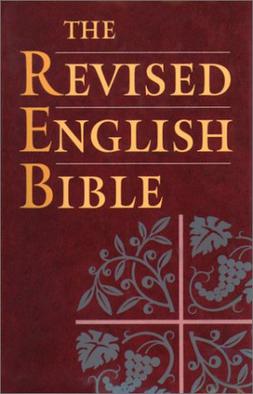
The Revised English Bible (REB) is a 1989 English-language translation of the Bible that updates the New English Bible (NEB) of 1970. As with its predecessor, it is published by the publishing houses of both the universities of Oxford and Cambridge. It is not to be confused with the Revised English Bible of 1877, which was an annotated and slightly emended King James Bible.

Modern English Bible translations consists of English Bible translations developed and published throughout the late modern period to the present.

4 Maccabees, also called the Fourth Book of Maccabees and possibly originally known as On the Sovereignty of Reason, is a book written in Koine Greek, likely in the 1st or early 2nd century. It is a homily or philosophic discourse praising the supremacy of pious reason over passion. It is a work that combines Hellenistic Judaism with influence from Greek philosophy, particularly the school of Stoicism.
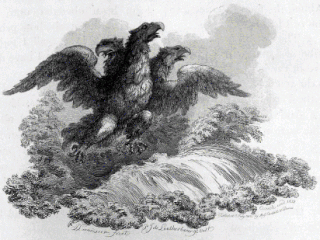
2 Esdras is an apocalyptic book in some English versions of the Bible. Tradition ascribes it to Ezra, a scribe and priest of the fifth century BC, whom the book identifies with the sixth-century figure Shealtiel.

Bruce Manning Metzger was an American biblical scholar, Bible translator and textual critic who was a longtime professor at Princeton Theological Seminary and Bible editor who served on the board of the American Bible Society and United Bible Societies. He was a scholar of Greek, New Testament, and New Testament textual criticism, and wrote prolifically on these subjects. Metzger was an influential New Testament scholar of the 20th century. He was elected to the American Philosophical Society in 1986.

Philippians 2 is the second chapter of the Epistle to the Philippians in the New Testament of the Christian Bible. It is authored by Paul the Apostle about mid-50s to early 60s AD and addressed to the Christians in Philippi. Jesuit theologian Robert Murray notes that a narrative in verses 5-11 about Christ, "who humbled himself, by becoming obedient to death" is central to this chapter. German protestant theologian Ernst Lohmeyer argued in 1928 that verses 6–11 were an existing hymn about Christ which Paul quotes in his letter, a theory which "has come to dominate both exegesis of Philippians and study of early Christology and credal formulas".
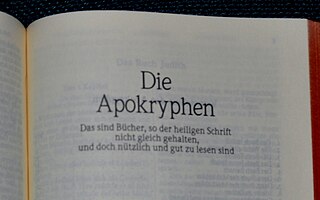
The biblical apocrypha denotes the collection of apocryphal ancient books thought to have been written some time between 200 BCE and 100 CE.
The Old Testament is the first section of the two-part Christian biblical canon; the second section is the New Testament. The Old Testament includes the books of the Hebrew Bible (Tanakh) or protocanon, and in various Christian denominations also includes deuterocanonical books. Orthodox Christians, Catholics and Protestants use different canons, which differ with respect to the texts that are included in the Old Testament.
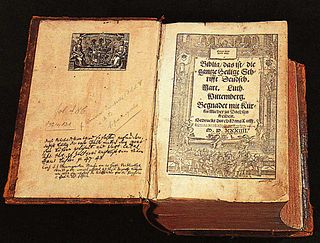
Luther's canon is the biblical canon attributed to Martin Luther, which has influenced Protestants since the 16th-century Protestant Reformation. While the Lutheran Confessions specifically did not define a biblical canon, it is widely regarded as the canon of the Lutheran Church. It differs from the 1546 Roman Catholic canon of the Council of Trent in that it rejects the deuterocanonical books and questions the seven New Testament books, called "Luther's Antilegomena", four of which are still ordered last in German-language Luther Bibles to this day.
A biblical canon is a set of texts which a particular Jewish or Christian religious community regards as part of the Bible.

A Protestant Bible is a Christian Bible whose translation or revision was produced by Protestant Christians. Typically translated into a vernacular language, such Bibles comprise 39 books of the Old Testament and 27 books of the New Testament, for a total of 66 books. Some Protestants use Bibles which also include 14 additional books in a section known as the Apocrypha bringing the total to 80 books. This is in contrast with the 73 books of the Catholic Bible, which includes seven deuterocanonical books as a part of the Old Testament. The division between protocanonical and deuterocanonical books is not accepted by all Protestants who simply view books as being canonical or not and therefore classify books found in the Deuterocanon, along with other books, as part of the Apocrypha. Sometimes the term "Protestant Bible" is simply used as a shorthand for a bible which contains only the 66 books of the Old and New Testaments.

Romans 3 is the third chapter of the Epistle to the Romans in the New Testament of the Christian Bible. It was composed by Paul the Apostle, while he was in Corinth in the mid-50s AD, with the help of an amanuensis (secretary), Tertius, who added his own greeting in Romans 16:22.














